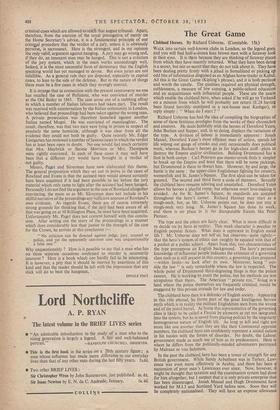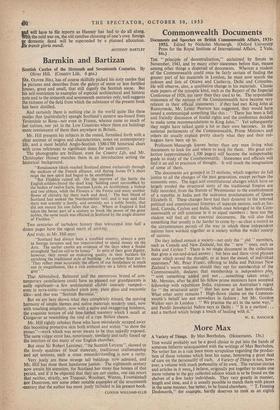The Great Game
Clubland Heroes. By Richard Usborne. (Constable. 15s.) WALK into certain well-known clubs in London, so the legend goes, and you will find half-a-dozen lean brown men with a faraway look in their eyes. It is there because they are thinking of faraway places from which they have recently returned. What they have been doing is a secret, but not so secret that they do not talk about it. They have been dealing pretty firmly with a jehad in Somaliland or picking up odd bits of information disguised as an Afghan horse-trader in Kabul. All this is the Great Game (Kipling's phrase), and it is both perilous and worth the candle. The qualities required are physical strength, ruthlessness, a measure of low cunning, a public-school education and an acquaintance with influential people. These are the assets which enable the clubland hero, when asked if he will go to Yarkand on a mission from which he will probably not return (E.24 having been found horribly mutilated in a rest-house near Kashgar), to reply simply : " When do I start ? "
Richard Usborne has had the idea of compiling the biographies of some of these fictitious prodigies from the works of their chroniclers and creators. He deals faithfully with the heroes of Dornford Yates, John Buchan and Sapper, and, in so doing, displays the variations of the type. A division of labour is immediately apparent : Jonah Mansel, Dornford Yates's most efficient man of action, spends his life wiping out gangs of crooks and only occasionally does political work, whereas Buchan's heroes go in for high-class stuff—plots to destroy the Empire and/or civilisation. Bulldog Drummond has a foot in both camps : Carl Peterson qua master-crook finds it simpler to break up the Empire and trust that there will be some pickings, but Drummond is there to thwart him. However, by and large, the battle is the same : the upper-class Englishman fighting for country, womenfolk and St. James's-Square. The first ideal can be taken for granted. The second and third form a code of manners. Sexually the clubland hero remains adoring and unsatisfied. Dornford Yates allows his heroes a playful romp, but otherwise overt love-making is avoided. As for St. James's Square, its standards are accepted throughout the hero's career. Richard Hannay may start as a rough-neck, but, as Mr. Usborne points out, he does not stay a rough-neck very long. St. James's Square has done its work, and there is no place in it for disreputable friends like Peter Pienaar.
The type and the ethos are fairly clear. What is more difficult is to decide on its basis in reality. This stock character is peculiar to English popular fiction. What does it represent in English social life ? Mr. Usborne does not tell` us, but observes—quite rightly— that the hero's system of ethics can roughly be equated with that of a prefect at a public school. Apart from this, two characteristics of the type presuppose an English background. The hero's personal knowledge of influential people indicates the existence of a governing class such as is still present in this country, a governing class prepared —within limits—to look after its own. Mcireover, being " out- side the law " is only remarkable where the law is respected. The whole point of Drummond third-degreeing thugs is that the police cannot. He is working to assist the police, but his methods are less scrupulous than theirs. The American " private eye," living in a land where the police themselves are frequently criminal, would be staggered by this private crusade for law and order.
The clubland hero then is a defender of English society. Appearing in this role abroad, he forms part of the great Intelligence Service myth which is in reality the militant Englishman seen from the wrong end of the pistol barrel. At home this representative of the governing class is likely to be called a Fascist by elements as yet not integrated into the system, but he is saved from playing politics by the singularly homogeneous nature of English life. As long as left and right are more like one another than they are like their Continental opposite numbers, the clubland hero can confidently represent a united nation in his tussles with the forces of disorder. No doubt, the Labour government made as much use of him as its predecessors. Here is where he differs from the politically-minded adventurers portrayed by Malraux or von Salomon.
In the past the clubland hero has been a tower of strength for any British government. While Sandy Arbuthnot was in Turkey, Law- rence was even more effectively in Arabia, and there has been a' succession of poor man's Lawrences ever since. Now, however, it might be thought that taxation and the examination system had done for him altogether, but I suspect that it is only private enterprise that has been discouraged. Jonah Mansel and Hugh Drummond have worked for M.I.5 and Scotland Yard before now. Soon they will be completely nationalised. They will have an expense allowance lotd will have to file reports as Hannay has had to do all along. With the cold war on, the old carefree choosing of one's own foreign 'or domestic fiend will be superseded by a planned allocation. pe transit gloria mundi.
ANTHONY HARTLEY



































 Previous page
Previous page